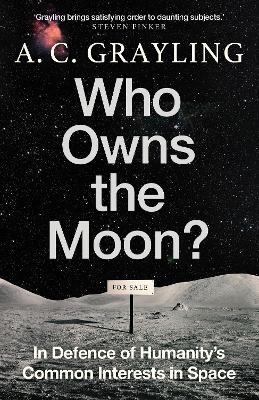
Who Owns the Moon?
In Defence of Humanity’s Common Interests in Space
Seiten
2024
Oneworld Publications (Verlag)
978-0-86154-725-8 (ISBN)
Oneworld Publications (Verlag)
978-0-86154-725-8 (ISBN)
A Defence of Our Intergalactic Common Interests
As the world's superpowers and corporations jostle for control in space, A. C. Grayling asks: who really owns our planet?
'Grayling brings satisfying order to daunting subjects.' STEVEN PINKER
Silicon for microchips; manganese for batteries; titanium for missiles.
The moon contains a wealth of natural resources. So, as the Earth’s supplies have begun to dwindle, it is no surprise that the world’s superpowers and wealthiest corporations have turned their eyes to the stars. As this new Space Race begins, A.C. Grayling asks: who, if anyone, owns the moon? Or Mars? Or other bodies in near space? And what do those superpowers and corporations owe to Planet Earth and its inhabitants as a whole?
From feudal common land, through the rules of the sea, to the vast, nationless expanse of Antarctica, Grayling explores the history of the places which no one, and therefore everyone, owns. Examining the many ways this so-called terra nullius has fallen victim to ‘the tragedy of the commons’ – the tendency for communal resources to be exploited by a few individuals for personal gain at the expense of everyone else – Who Owns the Moon? puts forward a compelling argument for a bold new global consensus, one which recognises and defends the rights of everyone who lives on this planet.
As the world's superpowers and corporations jostle for control in space, A. C. Grayling asks: who really owns our planet?
'Grayling brings satisfying order to daunting subjects.' STEVEN PINKER
Silicon for microchips; manganese for batteries; titanium for missiles.
The moon contains a wealth of natural resources. So, as the Earth’s supplies have begun to dwindle, it is no surprise that the world’s superpowers and wealthiest corporations have turned their eyes to the stars. As this new Space Race begins, A.C. Grayling asks: who, if anyone, owns the moon? Or Mars? Or other bodies in near space? And what do those superpowers and corporations owe to Planet Earth and its inhabitants as a whole?
From feudal common land, through the rules of the sea, to the vast, nationless expanse of Antarctica, Grayling explores the history of the places which no one, and therefore everyone, owns. Examining the many ways this so-called terra nullius has fallen victim to ‘the tragedy of the commons’ – the tendency for communal resources to be exploited by a few individuals for personal gain at the expense of everyone else – Who Owns the Moon? puts forward a compelling argument for a bold new global consensus, one which recognises and defends the rights of everyone who lives on this planet.
A. C. Grayling is the Founder and Principal of the New College of the Humanities at Northeastern University, London, and its Professor of Philosophy. Among his many books are The God Argument, Democracy and Its Crisis, The History of Philosophy, The Good State and Philosophy and Life. He has been a regular contributor to The Times, Guardian, Financial Times, Independent on Sunday, Economist, New Statesman, Prospect and New European. He has appeared on radio and TV, including BBC’s Today programme and Newsnight and on CNN News. He lives in London.
| Erscheinungsdatum | 27.02.2024 |
|---|---|
| Verlagsort | London |
| Sprache | englisch |
| Maße | 135 x 216 mm |
| Themenwelt | Geisteswissenschaften ► Philosophie ► Ethik |
| Recht / Steuern ► EU / Internationales Recht | |
| Sozialwissenschaften ► Politik / Verwaltung ► Politische Theorie | |
| Sozialwissenschaften ► Soziologie | |
| ISBN-10 | 0-86154-725-X / 086154725X |
| ISBN-13 | 978-0-86154-725-8 / 9780861547258 |
| Zustand | Neuware |
| Haben Sie eine Frage zum Produkt? |
Mehr entdecken
aus dem Bereich
aus dem Bereich
unsere kollektive Verantwortung
Buch | Hardcover (2023)
wbg Theiss in Wissenschaftliche Buchgesellschaft (WBG) (Verlag)
35,00 €


